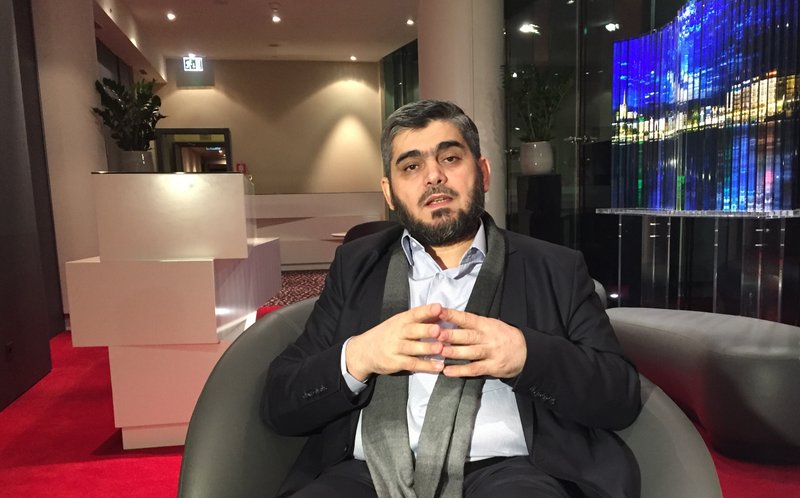BEIRUT -- The chief Syrian opposition negotiator in the Geneva peace talks has resigned amid no signs of progress in the peace process that began earlier this year.
On Monday night, a wave of airstrikes on a rebel-held stronghold in northwest Syria was said to kill several civilians.
Mohammed Alloush said he resigned because the international community is not "serious" about reaching a solution for the country's five-year civil war. His statement, released late Sunday, also said that Syrian government forces continue attacking the opposition and besieging rebel-held areas, despite the three rounds of negotiations in Geneva.
The "proximity" talks that began in January have failed to make any progress amid contrary demands by the opposition team and the government delegation.
The Syrian opposition has insisted that political transition come first, while the government says fighting terrorism should be the priority. The last round was held in April, and no date has been set for the next talks.
As further evidence of the peace talks' failure, Alloush said that the United Nations has not been able to set up a transitional governing body for Syria or find a political solution to the crisis.
The opposition has insisted that President Bashar Assad and the top official in his government have no role in Syria's future -- or even during the transitional period.
Alloush said he handed in his resignation to the opposition's Higher Negotiating Committee and described his move as a "protest against the international community," which he hoped would come to realize "the importance of the Syrian blood that is being shed by the [Damascus] regime and its allies."
Josephine Guerrero, a spokesman for U.N. special envoy for Syria, Staffan de Mistura, told The Associated Press in Geneva that the resignation is an "internal matter for the [Higher Negotiating Committee]."
"We look forward to continuing our work with all sides to ensure that the process moves forward," she said.
The Syrian Observatory for Human Rights monitoring group counted 10 airstrikes on the city of Idlib in the northwest in the evening, which it said killed at least 14 civilians, including three children. The group said it believed Russian jets were responsible.
The Local Coordination Committees, an activist network, said 10 people were killed when the city's National Hospital was hit, but had no details about casualties elsewhere in the city.
The opposition Civil Defense, which carries out rescue operations, gave a much higher casualty figure, saying dozens were killed and hundreds wounded in the airstrikes in which several hospitals were damaged. The group said it had deployed its entire Idlib corps to take part in rescue operations.
The Observatory said hospitals were not targeted, but suffered damage when bombs struck nearby.
Earlier Monday, Syrian state media said the rebels shelled government-held parts of the provincial capital, Aleppo, inflicting casualties.
More than 160,000 civilians have been trapped by the fighting between the Islamic State and Syrian rebels, and the aid group Doctors Without Borders last week evacuated one of the few remaining hospitals from the Aleppo area.
Meanwhile, the International Rescue Committee said that over the weekend more than 8,000 people managed to escape villages and displacement camps to the east and south of the rebel-held town of Azaz.
The International Rescue Committee said that before the road became too dangerous, about 6,000 people managed to flee the rebel stronghold of Marea to seek safety in Azaz. It added that more than 1,000 people managed to reach the Kurdish area of Afrin and more than 1,200 people fled to a makeshift refugee camp on Yazibag mountain.
Also Monday, an international plan to deliver aid to hundreds of thousands of people living in besieged areas appeared to be in peril, with the deadline looming closer.
Doubts about the initiative, which is backed by the U.N. and involves airdrops of food and other humanitarian relief, have been growing since it initially elicited guarded praise. Russia, the U.S. and other outside forces involved in Syria's civil war agreed this month to begin airdrops Wednesday if road convoys continued to be refused access.
The logistics of delivering food and medicine by parachute are extremely complex and unreliable, U.N. officials said. And diplomats and analysts said Syria's government is unlikely to permit airdrops when it shows little sign of relenting on road convoys.
Information for this article was contributed by Hugh Naylor of The Washington Post and by Jamey Keaten and Albert Aji of The Associated Press.
A Section on 05/31/2016

